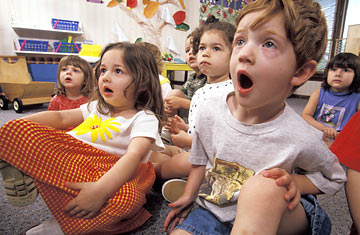
Over the years, day-care and child-care centers have become a security blanket for millions of working parents who need their children looked after during the day. But as an H1N1 epidemic draws closer, these centers look less like protective bastions and more like potential H1N1 incubators.
"Since the virus has emerged, we've seen a number of groups that are at higher risk for complications from H1N1, and these include children under 5 and especially children younger than 2," says Bill Hall, a spokesman for the Department of Health and Human Services. "Infants younger than 6 months cannot receive the H1N1 vaccine because their immune systems are not developed enough to tolerate it," he adds. To date, the Centers for Disease Control and Prevention has recorded 76 deaths of people under age 18. For day-care centers, that means more than just a risk of low child attendance; it's a huge potential liability.
A parent whose child contracts H1N1 at a day-care center because of negligent supervision could sue the facility, says David Wolf, a child-injury lawyer and partner at Wood, Atter & Wolf in Jacksonville, Fla. Wolf concedes that the mere acquisition of minor flulike symptoms would typically be insufficient to litigate an injury case. But there is a potential, he says, if there's extended hospitalization, permanent injury or death. (To date, he is unaware of any such lawsuits.)
To protect all parties, including owners, day-care-center gatekeepers will need to play an increasingly prominent role in keeping symptomatic kids off the premises. Even though standards of efficiency in child-care centers — including appropriate staff-to-children ratios, cleanliness of the premises and good hygiene practices — are mandated, many day-care centers that operate in the U.S. are not in compliance with state regulations, says Wolf. Further, parents may not realize that most church-based day-care centers are exempt from certain regulations that are required by the state.
As the media saturates consumers with swine-flu recommendations, however, many day-care-center owners are rising to the challenge. "We started preparing last spring and have placed a heightened focus on retraining staff on hand-washing and sanitizing procedures throughout the center, with special attention in the sign-in area," says Beth Woodward, spokeswoman for Knowledge Learning Corp., the parent company of KinderCare Learning Centers.
Barbara Harwell, who has owned and operated Tender Loving Care, in Elkhart, Ind., for the past 18 years, has allocated more of her budget to bleach and cleaning products; she's been known to send home parents with their filthy diaper bags and instructions to wash them.
But, says Wolf, it's not just up to the centers. Parents also need to be more vigilant. "Day-care establishments are like nursing homes and hospitals," he says. "If you park a person there and never visit, you'll never know what's going on."
